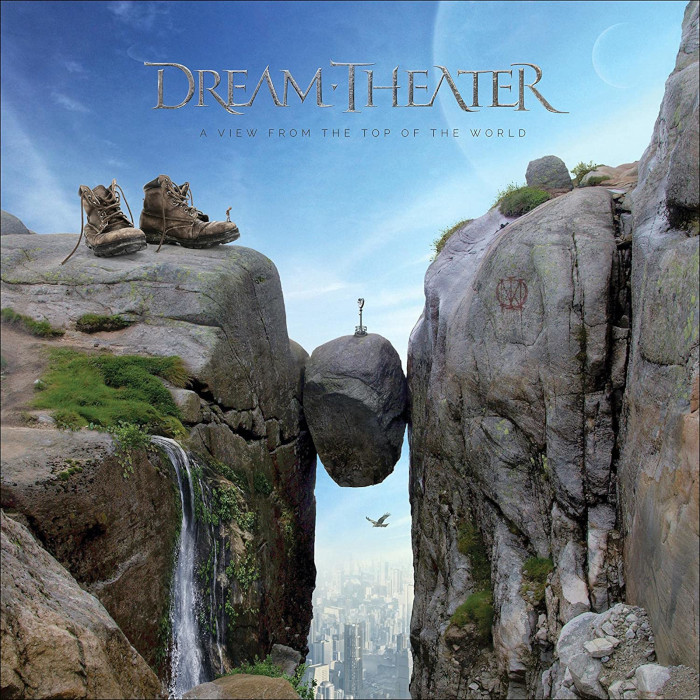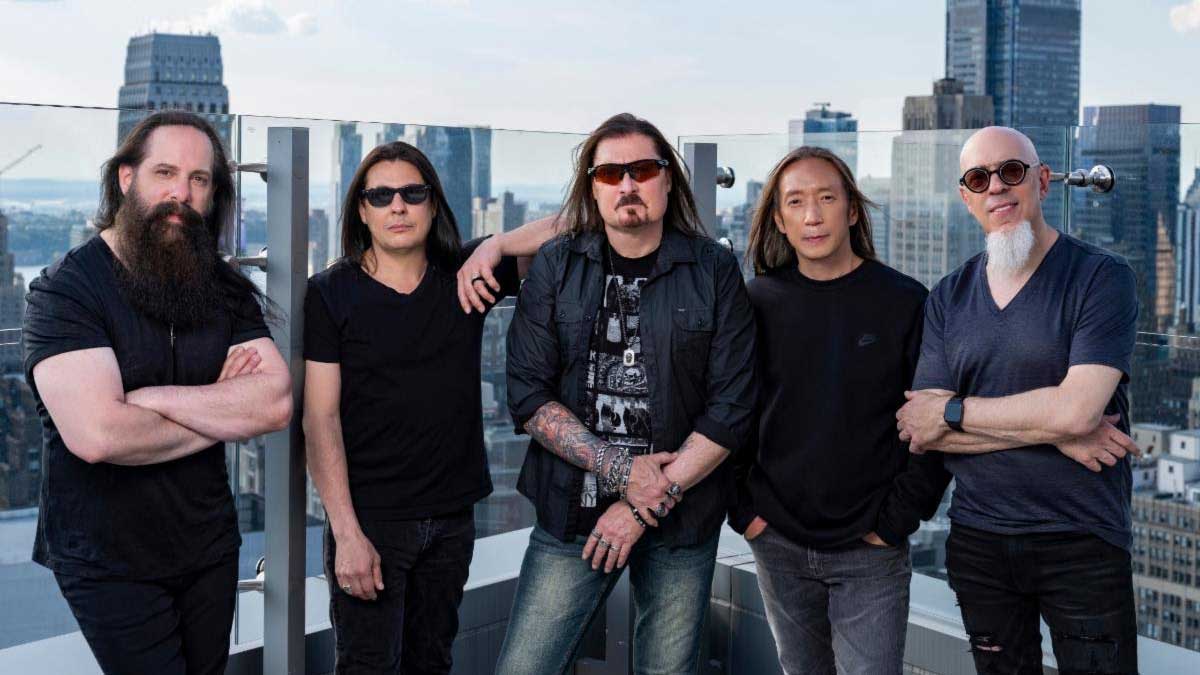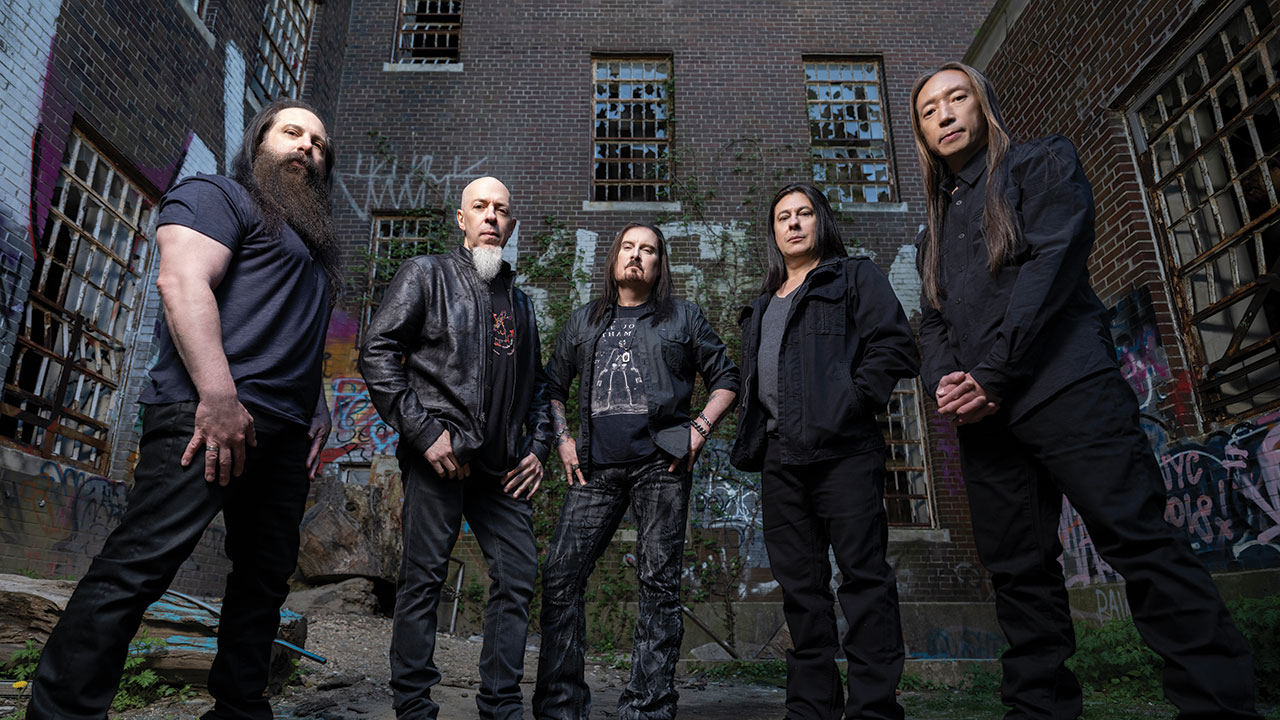At some point in their career every band inevitably gets it in the neck from a section of their fanbase. When Dream Theater released their fifteenth studio album A View From The Top Of The World in 2021, Prog found guitarist John Petrucci and singer James LaBrie in defiant mood...
Tucked away in an inconspicuous industrial park in the centre of Long Island, New York, is Dream Theater’s newly renovated bolthole. In the space of a mere
18 months, this studio/rehearsal space has been the setting for the recording of Dream Theater guitarist John Petrucci’s solo album, the third Liquid Tension Experiment album, and, in October 2020, where Dream Theater reunited to record their latest album, A View From The Top Of The World.
“My solo album, Terminal Velocity, was the first thing that I actually did in there,” recalls Petrucci. “It proved we could make a record here and for me, at the start of the pandemic in March 2020, it kept my sanity because it’s only about 20 minutes from my house. So, it became my office and I’d go there every day to work on the record and do the thing that I love, which is to play the guitar and be creative. We knew that we could record there and that it would sound awesome. It’s nice being in a space where you’re not worried about hourly overheads, which you would have been in a studio. Even if you blocked it out for a couple of months that could really add up quickly.”
Although the band weren’t scheduled to write another album, the loss of touring over the last year provided them with the opportunity to reconvene in the studio. With his solo album and Liquid Tension Experiment records recently released, a dearth of fresh ideas would have been understandable. But Petrucci explains that ongoing musical inspiration and a different approach to writing led to a wealth of music being created.
“If it was ever to come to a stop, it would have been over the last year and a half,” says the guitarist with a laugh. “I’ve made three records, one after the next, and my attitude was: ‘Let’s just go in and see what happens.’ When we first went into the studio, I was thinking we could go about things differently. I felt we could perhaps simplify the recording and have more of a Rush Moving Pictures vibe. Once we started and wrote a track like The Alien, we realised that wasn’t going to happen. The Alien was in a time signature that [drummer] Mike Mangini always wanted to do. We started playing along and the next thing you know, a song starts to develop. This album reminds me more of the old school, when you would get together with your band in rehearsals and write music. It’s the way that an album like Images And Words or our first album [When Dream And Day Unite] came together. We could just play, have fun and enjoy the time together.”

With their singer James LaBrie unable to link up with the band due to travel restrictions, he joined them via video link, his face appearing on a screen in the corner of the studio. Although the bizarreness of the situation isn’t lost on LaBrie, he admits to finding it useful to be remote as it allowed him space to work on vocal melodies and lyrics.
“I was in my studio here in Canada, and I was able to have our engineer, Jimmy T [James Meslin], pipe the band in so that it sounded fantastic,” says LaBrie. “It was as if I was right in the room with them. In the past, if I had an idea in my head, I’d have to wait until they finished running something through before putting the idea down. This way, it was beautiful as I could mute them. I would have a recording device next to me and put something down straight away. It was a stronger situation for me, in the sense that I could control the environment. I then travelled to Long Island to record the vocals in the studio with John. It was something that we hadn’t done since Black Clouds & Silver Linings [2009]. So, it was interesting to come back to that and we had a lot of fun, joking around with each other.”
Noticeably, the songs collated on A View From The Top Of The World have a distinctive, progressive edge that hark back to their 1992 album Images And Words and 1999’s Metropolis Pt 2: Scenes From A Memory. That influence is especially noticeable on Transcending Time and the title track, but Prog wonders if there was a conscious effort to propel the music in that direction?
“I think that over the last few years, we reacquainted ourselves with those two albums after playing them live,” suggests Petrucci. “We were reminding ourselves of what was happening then and that writing style. The songs were longer and less traditional, they were more progressive but still heavy. We certainly did that with our last album, Distance Over Time, but it was in a more compact package. We were taking what we learned from that album and infusing it with those memories we had from playing that older material live. We were in a headspace of not putting any limitations on the music or worrying about song lengths. From that, the more progressive side was spawned because we weren’t putting any confines on the music.”
Drummer Mike Mangini might have been with the band for more than a decade, but it's clear he’s now become a pivotal part of the writing sessions, suggesting approaches and directions. It’s a role that he’s relishing and one that’s appreciated by his bandmates, as LaBrie explains.
“For the last couple of albums, he really has been so integral to the songs,” the singer says. “I think that’s why people are hearing him on the album and saying, ‘Oh, so this is Mike Mangini.’ That really isn’t to take away from what he did with the previous albums. It’s just that he was more sitting in as a drummer before but now he’s able to show who and what he is because he is very much a part of all the writing. I think he sounds phenomenal on the album.”

LaBrie also reveals that he’s contributed a pair of lyrics on this album, for The Alien and Answering The Call. The latter references some of the grimmer aspects of life in Saudi Arabia, but the singer reveals that he was conscious of ensuring that his words were not overly politicised or sanctimonious.
“I never like to be preachy, and I always want to keep it so that the listener can interpret the words,” he explains. “Some lyricists are extremely political but that’s not my bag. I’ve never really appreciated that but if that’s their thing, they should go for it. I just don’t want to listen to it. With this song, I happened to watch a documentary about Saudi Arabia and I was extremely disturbed and upset. Those lyrics are dealing with the atrocities that the civilians in Saudi Arabia have to deal with. There’s a square where they do public executions. Women are stoned to death or just beheaded. It’s horrible but I didn’t want to be that clear in the song. I wanted to represent the thought of when do we stand up? We know what’s right and what’s fair, and when are we going to consciously take note of that voice and do something about it?”
For a band of Dream Theater’s stature, there’s always an understandable, excited hullabaloo that surrounds each studio release. But there remains a section of their fanbase who appear to delight in criticising the band, whether that’s the production, Mike Mangini’s drum sound, “Or the vocals,” interjects LaBrie, perhaps sensing the direction of conversation.
“It’s a toxic environment, it really is,” he asserts. “Do you know what I’d like to say to those people? If you want to bash my vocals and you think that I’m not capable of doing it, just go on my Cameo [personalised video messaging website] and watch my videos. They are bare bones, with me in my en-suite, singing the songs that my fans are asking for. By that, I mean true fans who are asking me to sing for them, whether that be Happy Birthday, Another Day or Learning To Live. It doesn’t matter. It’s just me standing there and going for it. It’s unfortunate because there are some live recordings, like a Budokan show [in Tokyo], when we performed Images And Words in full [where] I was feeling like shit, but we still had to go on there and record. Now I could have said, ‘Guys, we’re never going to release this’, but I’m willing to put it out, even though I know I could have done much better. I think it’s just the world that we live in. Jordan [Rudess, keyboards] said to me, ‘Well guys, get ready because somebody is going to tell us what we’re not doing it right.’ So yes, bring it on, as we know what’s coming.”
“Personally, if I wasn’t crazy about something, I don’t feel the need to go on there and start lambasting someone,” states Petrucci forcefully. “There are some things that I just don’t get. If somebody says, ‘Well this sounds like the same old thing’ or ‘When are they going to do something different?’ it’s a weird comment to make. People long for bands to do their thing. All that people want Metallica to do is like sound like Metallica. You know what I mean? To say it sounds too much like Dream Theater, I just can’t wrap my head around it. You know, what do you want us to sound like? Should we sound like another band? That’s so bizarre to me.”
In spite of such snide distractions, A View From The Top Of The World is a recording that has an innate positivity and energy that should thrill their followers. It’s therefore a reasonable assertion that it shouldn’t attract the level of polarised, exaggerated venom that 2016’s progressive rock opera, The Astonishing, received.
“Well, The Astonishing was so over-the-top,” agrees Petrucci. “For us to turn that into a novel and then the most over-the-top show we’ve ever done, checked off every single creative box for me. Was it maybe a little bit selfish on my part in getting it out there? Maybe, but it’s something that I’ve no regrets about. So yes, because of all that, I understood that the reaction was going to be mixed. Whereas an album like our new one, this might sound arrogant, but if you’re a fan, how could you not like it? This album is just so Dream Theater that, if you like the band, you’re going to love this record. It’s everything that we’re about. This record isn’t safe, but we also haven’t done something where people will be saying, ‘What the hell were those guys thinking?’ It exemplifies everything that we do. There’s nothing lazy about it. It’s really fired up and I love that.”
